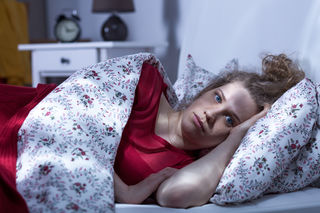Sleep
3 Habits That Could Be Wrecking Your Sleep
2. That glass of wine only seems like it's helping you to unwind.
Posted December 28, 2016 Reviewed by Devon Frye
Key points
- Not getting enough high-quality sleep is associated with significant health problems and day-to-day cognitive challenges.
- An inconsistent sleep schedule is among the most common obstacles to restorative sleep, but it's far from the only one.
- The foods you eat and your pre-bed behaviors may be interfering with sleep in unexpected ways.

One of the best ways to improve your overall health is by changing behaviors that disturb your sleep. Some are well-known: For example, you probably know that keeping an erratic bedtime schedule or drinking a late latte may interfere with your nightly slumber. But other behaviors that can disrupt your sleep often go unnoticed.
Here are three less-discussed sleep disruptors you should know about:
1. Eating too little fiber or too much fat and sugar.
There’s strong evidence that lack of sleep increases the likelihood of consuming too many calories, gaining weight, and becoming obese. Until recently, less was known about how eating habits may affect getting enough sleep. But a study published in 2016 by Columbia University researchers sheds new light on the relationship between food choices and sleep quality.
The study included 36 adults (ages 30 to 45) who were normal weight and typically slept a healthy amount. During five nights in a sleep lab, the participants got an average of seven-and-a-half hours of sleep. Objective sleep data were gathered by polysomnography, a noninvasive test that measures brain-wave patterns, blood oxygen levels, heart and breathing rates, and other physiological changes while a person sleeps. The researchers then compared data collected after a few days on a nutritious controlled diet versus one day of self-selected foods.
Eating less fiber and more saturated fat was associated with getting lighter, less restorative sleep. Greater sugar consumption was also linked to waking up more often during the night. In addition, it took participants an average of 12 minutes longer to fall asleep after eating foods of their choice, compared to eating controlled, well-balanced meals.
2. Unwinding with a glass of wine.
An evening tipple might make you feel drowsy and help you doze off faster. But it may also result in poorer quality sleep. In a study by University of Melbourne researchers, two dozen young adults (ages 18 to 21) spent a few nights in a sleep lab. On one night, they drank vodka and orange juice before hitting the sack. On another, they drank a placebo cocktail—straight orange juice with a vodka-dipped straw. Later, as they slept, the electrical activity inside their brains was monitored and recorded with electroencephalography (EEG testing).
Alcohol increased slow-wave sleep delta power, a pattern of brain activity associated with deep sleep. Yet at the same time, alcohol increased frontal alpha power, a pattern of brain activity usually associated with resting quietly while awake. Together, these competing types of brain activity likely interfered with participants' ability to get a refreshing night’s sleep.
According to the National Sleep Foundation, an evening drink may also sabotage sleep in other ways: Alcohol can throw the body’s whole sleep-regulation mechanism out of balance. By relaxing the muscles of the throat, it can also worsen breathing problems during sleep. Plus, by acting as a diuretic, it may prompt more trips to the bathroom.
3. Checking social media too frequently.
In a recent national survey, nearly 1,800 young U.S. adults (ages 19 to 32) answered several questions about social media use and sleep quality. Those who checked social media most often (58 or more times per week) were three times as likely to report sleep problems as those who used social media least often (eight or fewer times per week).
Because of the study’s design, the researchers weren’t able to determine the direction of causation. But they suggested three potential ways that overuse of social media might undermine sleep:
- People may spend time on social media that could otherwise be used for snoozing.
- If people get caught up in heated Twitter wars or Facebook exchanges, they may feel fired up when they should be winding down for the night.
- If people use electronic devices close to bedtime, the bright light emitted may promote wakefulness rather than drowsiness.
The relationship between sleep and social media is likely a two-way street, however. Another recent study showed that the more sleep loss college students racked up, the more time they later spent on Facebook. That may have been because browsing Facebook was an easy thing to do when they were tired and distracted due to sleep deprivation.
LinkedIn image: TheVisualsYouNeed/Shutterstock
References
Chan JKM et al. The Acute Effects of Alcohol on Sleep Electroencephalogram Power Spectra in Late Adolescence. Alcohol Clin Exp Res. 2015 Feb;39(2):291-9.
Levenson JC et al. The Association Between Social Media Use and Sleep Disturbance Among Young Adults. Prev Med. 2016 Apr;85:36-41.
Mark G et al. Sleep Debt in Student Life: Online Attention Focus, Facebook, and Mood. Paper presented at: 2016 CHI Conference on Human Factors in Computing Systems, May 7-12, 2016; San Jose, CA.
St-Onge M-P et al. Fiber and Saturated Fat Are Associated with Sleep Arousals and Slow Wave Sleep. J Clin Sleep Med. 2016 Jan;12(1):19-24.




